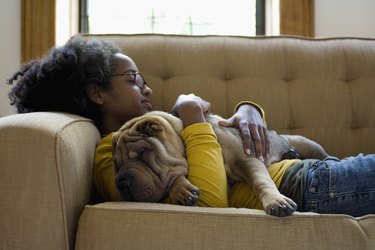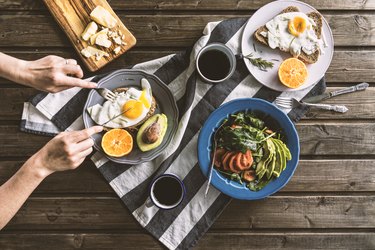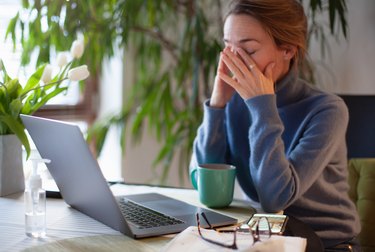
A good daytime nap can leave you feeling refreshed and ready to tackle the remainder of your day.
In fact, a pleasant power nap can promote many cognitive areas, including self-regulation, executive functioning, cognitive control, memory, attention and motor performance, says Sara Mednick, PhD, a cognitive neuroscientist at the University of California, Irvine and author of The Power of the Downstate: Recharge Your Life Using Your Body's Own Restorative Systems.
Video of the Day
Video of the Day
But to reap all these brain-based benefits, you need to be strategic about your midday snooze. That's because certain napping habits can have the opposite effect, sapping your energy (and possibly sabotaging your nighttime sleep).
Here, sleep experts share which mistakes to avoid when napping to help you wake up feeling revitalized.
1. You Nap Too Close to Bedtime
Catching zzzs in the latter hours of the day can detract from your nighttime sleep.
Slow wave sleep (or very deep sleep) is the most restorative, which is why you log the majority of it in the first part of the night when you're paying off your sleep debt (i.e., when your body requires it the most), Mednick says.
So if you nap too close to bedtime, "you're going to 'steal' some of that slow wave sleep from your nighttime sleep," she says.
With this reduction in sleep drive, you'll likely find it harder to drift off to dreamland and snooze for a shorter time at night, says Vishesh K. Kapur, MD, MPH, professor in the division of pulmonary, critical care and sleep medicine at the University of Washington.
Try this instead: If you’re going to nap, make sure you’re up approximately seven hours before bed. So, if you normally turn in by 10 p.m., plan to rise by 3 p.m. This will give you enough waketime to increase your sleepiness by bedtime, Mednick says.
2. You Nap Too Long (or Not Long Enough)
When you snooze, you cycle through different stages of sleep. And if you nap for longer than 20 or 30 minutes, you'll likely pass into the slow wave stage. But waking up from slow wave (also called deep non-REM) sleep could leave you feeling groggy, Dr. Kapur says.
This dazed, irritable state is called sleep inertia, Mednick says. Not only will you feel temporarily disoriented, but you'll also experience a decline in cognitive performance, including sluggish reaction time, poorer short-term memory and slower rates of learning, according to the Centers for Disease Control and Prevention (CDC).
Though sleep inertia will pass — it usually lasts from 30 to 60 minutes — it can still make daily tasks (like a work meeting or taking care of children) quite challenging. If you find yourself battling a bout of sleep inertia post-nap, try exposing yourself to bright light and washing your face (think: a splash of cold water), which can help increase alertness, per the CDC.
Try this instead: To sidestep sleep inertia and rise feeling refreshed, stick to napping for 20 minutes to a half hour. This will ensure that you’ll stay in light sleep, which is easier to wake up from, Mednick says.
Alternatively, Mednick also suggests that sleeping longer may be a smart strategy. That’s because a long, luxurious nap will get you through the slow wave sleep zone. This means that you’ll you wake up during a lighter stage of sleep like REM (the stage when most dreaming happens).
Aim to stop sleeping at the 90-minute mark, which is when you're likely to be back in a light state of sleep, according to the CDC. Just make sure to stop then. Once you hit this 90-minute mark, the whole cycle restarts.
3. You Nap as a Replacement for Regular Sleep
On occasion, you might find yourself leaning on a daytime snooze session when you didn't sleep well the night before. Though substituting a nap for nighttime sleep is a reasonable strategy if you can't clock enough hours in the p.m., naps are still not as revitalizing as a full night's slumber, Dr. Kapur says.
While a lot of research points to the power of naps to promote cognitive performance, many studies test the effects of naps in people who are well rested, i.e., those who get sufficient nighttime sleep, Mednick says.
This is an important distinction because it means that "the benefits of naps are on top of good sleep, not instead of," she says. In other words, you can't compensate for core sleep with a nap.
Try this instead: Think about using naps as an adjunct to nighttime rest and work on prioritizing sleep at night. Try these helpful habits to support your sleep health, per the CDC:
- Go to bed at the same time each night and get up at the same time each morning, including on the weekends.
- Make sure your bedroom is quiet, dark, relaxing and at a comfortable temperature.
- Remove electronic devices, such as TVs, computers and smart phones, from the bedroom.
- Avoid large meals, caffeine and alcohol before bedtime.
- Be physically active during the day, which can help you fall asleep more easily at night.
That being said, Mednick is hesitant to tell people how to use naps. If your nighttime sleep is suffering, and you’re really incapacitated by daytime sleepiness, sometimes naps are the only way you can get through the day. In these cases, consider consulting with a sleep specialist who’ll be able to properly assess your situation and assist you in a treatment plan.
4. You Don’t Create an Ideal Napping Environment
If you're trying to catch a couple of daytime winks while there's a symphony of car horns honking outside your window, napping might be difficult. It's pretty obvious, but "disruptions to sleep due to noise or discomfort" won't do you any favors in the napping department, Dr. Kapur says.
Even more important is making sure you feel safe in your napping space, Mednick says. It's rough to relax when you don't feel secure. For example, if you fall asleep on a park bench, are you worried about your wallet being stolen? Concerned you might get hit in the head by a stray soccer ball?
"When you fall asleep, you're vulnerable, so you want to make sure that you don't feel vulnerable," Mednick says.
Try this instead: Set up your environment for napping success. While this might look a little different for everyone, find somewhere you feel safe to sneak in a snooze.
It doesn’t necessarily have to be a dark place. In our modern world, we’ve adapted to sleeping while the sun’s up and while stuff is going on around us (think about all the times you’ve fallen asleep on a train or plane), Mednick says. But a quiet setting is ideal, she says.
To that end, turn off your phone. “All the buzzers and rings and things” should be set to silent, Mednick says. You can even use earplugs to decrease noise-related disturbances (and, if your napping spot's brightness is preventing you from drifting off, try a sleep mask).
5. You Don’t Set Your Alarm
We all have important tasks that we need to take care of during the day. Sometimes the fear of napping too long and mistakenly missing a midday meeting or arriving tardy for an afternoon carpool with the kids can keep you from a successful napping session.
Indeed, when you're anxious about sleeping too late, you might be too wound up to nap, Mednick says.
Try this instead: There’s a simple solution: set your alarm. This way you can nap without worrying about whether you’re going to oversleep and give yourself ample time to wake up, Mednick says.
6. You Don’t Keep a Consistent Nap Schedule
"If you try to nap randomly during the day without a consistent schedule, your body will not really get the clue that this is the time it should be falling asleep," Mednick says.
That's because humans are creatures of habit. Our bodies crave consistency and thrive with stable schedules. For instance, if you religiously go for a run at 8 a.m. every morning, your body will be prepared to exert energy at that time. Eat lunch at noon like clockwork? Your body will start sending hunger signals midday because it's programmed for receiving food at that time.
Same goes with napping. "Napping on a consistent schedule creates the information for your brain to be able to set you up for success in terms of falling asleep," Mednick says.
Try this instead: Nap at the same time every day. Once your body becomes accustomed to the habit, you’ll fall asleep faster and wake up feeling energized.
7. You Nap After a Heavy Meal
We've all felt sleepy after a big meal (hello, Thanksgiving!), but lying down after a large lunch may limit your ability to catch an effective catnap. Food has a big effect on how well you sleep, Mednick says. Heavy foods — like those high in fats, carbs or sugars — will be more difficult to digest and make it harder to slumber soundly, she says.
This may be particularly problematic for people with acid reflux. Here's why: Lying down creates a scenario in which your stomach and throat are at the same level, so stomach acid and digestive juices can easily flow back up the food pipe. Reflux can result in heartburn, which can hamper your nap plans.
In addition, other foods — like those that contain caffeine — will detract from your ability to doze off as well (more on this later).
Still, "napping at about 1 p.m. [i.e., around lunchtime] matches a circadian dip in alertness, which makes it easier to fall asleep," Dr. Kapur says.
Mednick agrees: around this time, your body experiences a decrease in arousal response due to your circadian rhythm. Simultaneously, your sleepiness is building from being awake. Put simply, it's a perfect storm for sleepiness. That's why napping midday is common in some cultures (think: Spain's custom of taking a siesta), Dr. Kapur adds.
Try this instead: You can still take advantage of your body’s natural circadian rhythm and plan a post-lunch nap. Just make sure your meal is conducive to shut-eye.
“Studies have shown that lean protein and vegetables are good for getting into slow wave sleep,” Mednick says. Other foods — like those that contain sleep-supporting hormones such as serotonin and melatonin — may also help you nestle nicely into nap mode.
8. You Nap When You Have Insomnia
Characterized as a sleep disorder, insomnia involves trouble falling (or staying) asleep at night.
And though napping can be a healthy habit for many, it can be harmful for an individual with insomnia, Dr. Kapur says. That's because when you snooze during the day, you use up some of your sleep drive that would facilitate falling and staying asleep at night, he says.
So taking daytime naps can actually add to the damaging cycle of staying awake in the wee hours.
Tip
If you have insomnia, you shouldn’t have to suffer sleepless nights and sleepy days. Speak with a sleep specialist who can help identify the root of your sleep problem and offer treatment options.
Try this instead: The treatment approach for insomnia usually entails nixing naps and restricting sleep to nighttime only, Mednick says. The idea is to build your sleep pressure (or your need for slow wave sleep). “Think of your brain and body as having a little ticker that’s counting the minutes you’ve been awake,” Mednick says.
As the number of waking minutes goes up, the greater your sleep pressure is. With insomnia, the goal is to make your sleep pressure so intense by bedtime that you’ll start to snooze as soon as your head hits the pillow.
9. You Consume Caffeine Before Napping
Some people think that consuming caffeine before a nap will help them rise feeling refreshed. And there's some science to support this claim. A caffeine high kicks in after approximately 30 minutes. So if you sip an espresso shot prior to a nap, then wake up a half hour later, you might feel more alert, according to the CDC.
While having a little pre-nap caffeine may slash sleep inertia, Mednick doesn't support making it a habit. When consumed in the afternoon, caffeine can cause sleep problems in the p.m., she says.
That's because caffeine has a half-life up to five hours, according to the American Academy of Sleep Medicine. Put another way, it can take up to five hours for your body to get rid of half of the drug. Which means when you drink it later in the day, it can disrupt sleep. Indeed, a November 2013 study published in the Journal of Clinical Sleep Medicine concluded that consuming caffeine even six hours before bed decreased sleep time by more than one hour.
When you get less nighttime sleep, you'll likely look to a cup of coffee the next day to stave off sleepiness. And then the whole damaging cycle continues once more, Mednick says.
Try this instead: Cut caffeine out of the equation in the afternoon, Mednick says. You’ll sleep better during your daytime naps and at night.
- Centers for Disease Control and Prevention: “Sleep Inertia”
- Centers for Disease Control and Prevention: “Tips for Better Sleep”
- Journal of Clinical Sleep Medicine: “Caffeine Effects on Sleep Taken 0, 3, or 6 Hours before Going to Bed”
- American Academy of Sleep Medicine: “Sleep and Caffeine”
- CDC: "NIOSH Training for Nurses on Shift Work and Long Work Hours"
Is this an emergency? If you are experiencing serious medical symptoms, please see the National Library of Medicine’s list of signs you need emergency medical attention or call 911.


